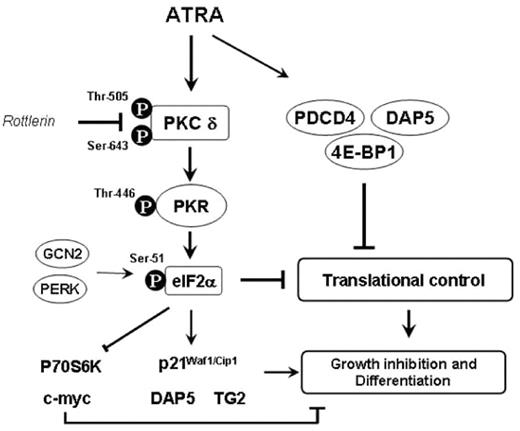Abstract
Overactivity of eukaryotic initiation factor-alpha (eIF2α) has been shown to be oncogenic and induces malignant transformation. Here we investigated the regulation and the role of eIF2α in the terminal differentiation of myeloid leukemia cells. We found that all-trans-retinoic acid (ATRA) and other granulocytic differentiation inducers, such as dimethylsulfoxide and arsenic trioxide inhibited activity of eIF2α by inducing serine 51 phosphorylation in promyelocytic leukemia cells (NB4). In contrast, activity of eIF2α was unaffected during ATRA-induced monocytic differentiation of U937 and THP-1 myelomonocytic cells and phorbol 12-myristate 13-acetate-induced monocytic/macrophagic differentiation of NB4 cells. Knockdown of eIF2α by RNA interference (siRNA) significantly inhibited (p<0.05) ATRA-induced differentiation, indicating that eIF2α is critical for the induction of granulocytic differentiation. ATRA-induced eIF2α phosphorylation was correlated with the expression and activity/phosphorylation (Thr505 and Ser643) of protein kinase Cδ (PKCδ) and eIF2a kinase PKR (Thr446). The specific PKCδ inhibitor Rottlerin significantly reduced phosphorylation of eIF2α, activity of PKR and blocked ATRA-induced granulocytic differentiation of NB4 cells (p<0.05). Knockdown of PKCδ by siRNA decreased PKR activity and increased eIF2α activity while knockdown of PKR increased eIF2α activity. We also observed that PKCδ regulates eIF2a activity in normal CD34+ bone marrow progenitor cells and breast and pancreatic cancer cell lines. Furthermore, we found that eIF2α regulated the expression and activity of important targets of ATRA, including c-myc, p21Waf1/Cip1, DAP5, GADD153, ATF-2, TG2, and p-P70S6K. In conclusion, our findings indicate that ATRA-induced granulocytic differentiation of myeloid leukemia cells is regulated by PKCδ through the activity of eIF2α, revealing a novel mechanism of granulocytic cell differentiation.
Author notes
Disclosure: No relevant conflicts of interest to declare.


